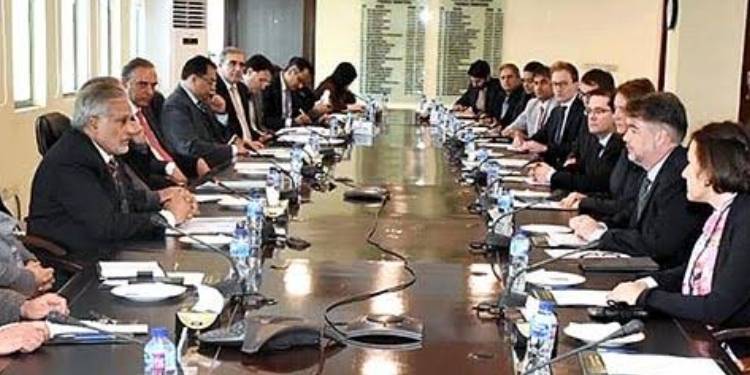
The International Monetary Fund (IMF) is set to hold meetings with the Pakistan government to discuss budget plans for the coming financial year (2023/04) in order to unlock the long-awaited $1.1 billion tranche to Pakistan's battered economy. The tranche has been delayed for months, and is critical for Pakistan to survive its balance of payments crisis.
Negotiations over key budget targets such as the fiscal deficit are among the last hurdles before the IMF approves a staff-level agreement to release the funding. A successful staff level agreement for the ninth review has been pending since November 2022.
The funding is a part of a $6.5 billion bailout package the IMF approved under Imran Khan's government in 2019. The current IMF programme for Pakistan is due to end in June 2023, before the government has to go into the budget session.
"In all IMF programmes, the authorities issue a letter of intent associated with the last review outlining their policy intentions for the period after the programme," Nathan Porter, mission chief to Pakistan, explained.
Pakistan's finance minister, Senator Ishaq Dar, has expressed confidence in the government's ability to meet the IMF programme's requirements, stating that he is committed to implementing reforms and improving the country's economic outlook. Analysts speculate that the PDM government may try to introduce a populist budget, to rescue its chances in a general election. This has caused consternation within PTI, even though former premier Khan is accused of doing the same before he was ousted in a vote of confidence.
The outcome of the discussions with the IMF will be closely watched by investors and analysts, as Pakistan's economic stability remains a key concern for the country's future growth prospects. The upcoming budget would also indicate whether general elections will be held anytime in the near future, or if the country is headed towards another constitutional crisis this autumn.
The IMF agreed to a financial assistance with Imran Khan's government in 2019, in an effort to help the country stabilize its economy and address its balance of payments crisis. However, Khan dithered in going to the IMF after forming his government, to stay true to his past rhetoric, and the funding program was subject to more delays and setbacks, as the COVID-19 pandemic exacerbated Pakistan's economic challenges.
As the funding lifeline nears its end, the discussions with the IMF are crucial for Pakistan's economic future. The country's ability to implement reforms and address its economic challenges will be closely monitored by the international community, and by Pakistan's allies such as China and Saudi Arabia.
Negotiations over key budget targets such as the fiscal deficit are among the last hurdles before the IMF approves a staff-level agreement to release the funding. A successful staff level agreement for the ninth review has been pending since November 2022.
The funding is a part of a $6.5 billion bailout package the IMF approved under Imran Khan's government in 2019. The current IMF programme for Pakistan is due to end in June 2023, before the government has to go into the budget session.
"In all IMF programmes, the authorities issue a letter of intent associated with the last review outlining their policy intentions for the period after the programme," Nathan Porter, mission chief to Pakistan, explained.
Pakistan's finance minister, Senator Ishaq Dar, has expressed confidence in the government's ability to meet the IMF programme's requirements, stating that he is committed to implementing reforms and improving the country's economic outlook. Analysts speculate that the PDM government may try to introduce a populist budget, to rescue its chances in a general election. This has caused consternation within PTI, even though former premier Khan is accused of doing the same before he was ousted in a vote of confidence.
The outcome of the discussions with the IMF will be closely watched by investors and analysts, as Pakistan's economic stability remains a key concern for the country's future growth prospects. The upcoming budget would also indicate whether general elections will be held anytime in the near future, or if the country is headed towards another constitutional crisis this autumn.
The IMF agreed to a financial assistance with Imran Khan's government in 2019, in an effort to help the country stabilize its economy and address its balance of payments crisis. However, Khan dithered in going to the IMF after forming his government, to stay true to his past rhetoric, and the funding program was subject to more delays and setbacks, as the COVID-19 pandemic exacerbated Pakistan's economic challenges.
As the funding lifeline nears its end, the discussions with the IMF are crucial for Pakistan's economic future. The country's ability to implement reforms and address its economic challenges will be closely monitored by the international community, and by Pakistan's allies such as China and Saudi Arabia.

